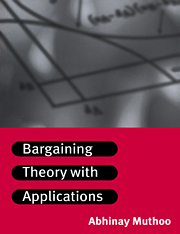4 - Risk of Breakdown
Published online by Cambridge University Press: 24 November 2009
Summary
Introduction
While bargaining the players may perceive that the negotiations might break down in a random manner for one reason or another. A potential cause for such a risk of breakdown is that the players may get fed up as negotiations become protracted, and thus walk away from the negotiating table. This type of human behaviour is random, in the sense that the exact time at which a player walks away for such reasons is random. Another possible cause for the existence of a risk of breakdown is that ‘intervention’ by a third party results in the disappearance of the ‘gains from co-operation’ that exists between the two players. For example, while two firms bargain over how to divide the returns from the exploitation of a new technology, an outside firm may discover a superior technology that makes their technology obsolete. Another example is as follows: while a corruptible policeman and a criminal are bargaining over the bribe, an honest policeman turns up and reports the criminal to the authorities.
In the next section I analyse a simple modification of the basic alternating-offers model — studied in Section 3.2 — in which the risk of breakdown is a main force that influences the bargaining outcome. It will be shown that the players' payoffs when (and if) negotiations break down and their respective degrees of risk aversion are crucial determinants of the bargaining outcome. Section 4.3 contains an application to the problem of tax collection when the tax inspector is corruptible.
Information
- Type
- Chapter
- Information
- Bargaining Theory with Applications , pp. 73 - 98Publisher: Cambridge University PressPrint publication year: 1999
